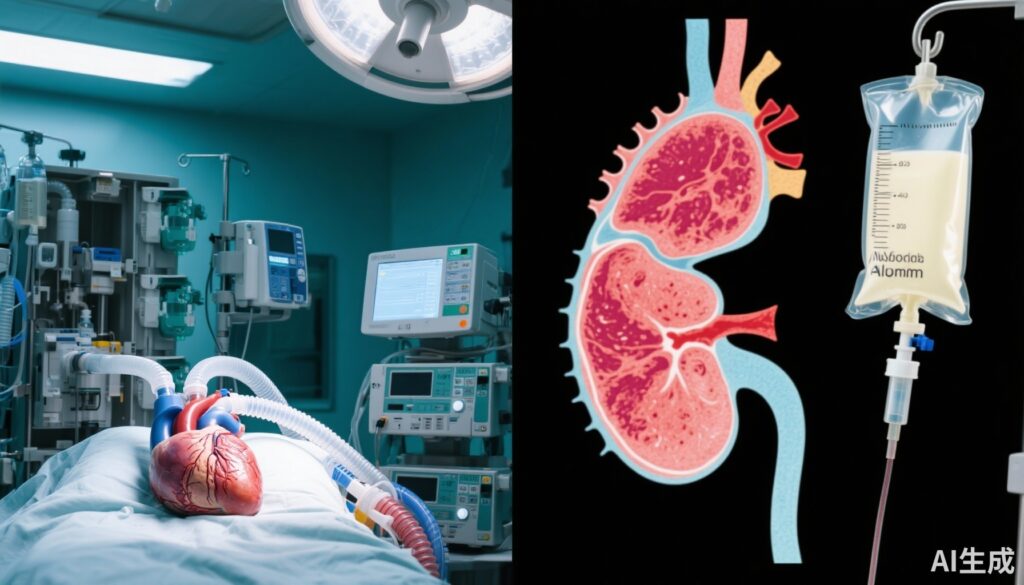Highlight
– The ALBICS AKI trial evaluated the impact of postoperative 20% albumin infusion on acute kidney injury (AKI) in high-risk cardiac surgery patients.
– Contrary to prior hypotheses, 20% albumin infusion increased the incidence of AKI, particularly in patients with reduced preoperative kidney function.
– The study found a higher rate of blood transfusions in the albumin group but no significant differences in major adverse kidney events or mortality.
– These findings do not support routine administration of hyperoncotic albumin for AKI prevention in this patient population.
Study Background and Disease Burden
Acute kidney injury (AKI) is a common and serious complication following cardiac surgery, associated with increased morbidity, mortality, and healthcare costs. The pathophysiology is multi-factorial, including ischemia-reperfusion injury, hemodynamic instability, inflammation, and nephrotoxic exposures. Patients undergoing complex cardiac surgeries, such as combined procedures or major aortic surgery, face especially high AKI risk. Maintaining adequate intravascular volume and renal perfusion postoperatively is critical, and albumin, a major plasma protein, has been considered potentially nephroprotective due to its oncotic properties, volume expansion effect, and antioxidant capacity.
Previous observational studies and smaller trials suggested that protein loading or colloid administration might reduce AKI incidence, prompting investigation into hyperoncotic albumin (20%) infusion as a therapeutic strategy. However, clinical evidence remained limited and equivocal about whether such intervention improves kidney outcomes in high-risk cardiac surgery patients.
Study Design
The ALBICS AKI trial was an investigator-initiated, randomized, multicenter, open-label pragmatic clinical trial conducted at seven cardiac centers across Australia and Italy from July 2019 to August 2024. Participants undergoing on-pump cardiac surgery with either a preoperative estimated glomerular filtration rate (eGFR) between 15 and 60 mL/min/1.73 m2 or undergoing combined cardiac procedures or major aortic surgery were enrolled. Key exclusions included patients with serum albumin <20 g/L, dialysis dependence, kidney transplant history, extracorporeal life support, ventricular assist devices, or refusal of albumin/blood products.
Subjects were stratified by center and baseline eGFR (<60 versus ≥60 mL/min/1.73 m2) and randomized within six hours postoperatively to receive either a 300-mL infusion of 20% albumin over 15 hours or usual care. Standard volume resuscitation and hemodynamic management followed institutional protocols in both arms.
The primary endpoint was the occurrence of stage 1 to 3 AKI as defined by the Kidney Disease Improving Global Outcomes (KDIGO) creatinine-based criteria. Secondary outcomes included major adverse kidney events (composite of death, new renal replacement therapy, or persistent kidney dysfunction) and all-cause mortality up to hospital discharge or day 28 post-randomization.
Key Findings
The trial enrolled a total of 611 patients: 307 assigned to the 20% albumin infusion group and 304 to usual care. The mean patient age was 69 years, with nearly half (45.8%) having preoperative eGFR <60 mL/min/1.73 m2. The median European System for Cardiac Operative Risk Evaluation (EuroSCORE) II was 3.23, reflecting a moderate to high surgical risk.
AKI incidence was higher in the albumin group: 48.9% (150/307) versus 43.4% (132/304) in usual care. The unadjusted relative risk was 1.13 (95% CI, 0.95-1.34; P=0.18), which was not statistically significant. However, the strata-adjusted relative risk accounting for site and baseline eGFR was 1.12 (95% CI, 1.04-1.21; P=0.003), indicating a significant 12% increase in AKI risk with albumin infusion.
Among patients with eGFR <60 mL/min/1.73 m2, the association was stronger, with an adjusted relative risk of 1.14 (95% CI, 1.07-1.22; P<0.001). This suggests the nephrotoxic effect of 20% albumin infusion was particularly pronounced in those with preexisting renal impairment.
Secondary endpoints including major adverse kidney events and mortality showed no statistically significant differences between groups. Notably, the albumin group received more blood transfusions (37.8% vs 29.9%; P=0.04), indicating potential safety concerns or perioperative bleeding risks linked to this intervention.
No other major differences in postoperative complications or hemodynamic parameters were observed.
Expert Commentary
The findings of the ALBICS AKI trial provide pivotal evidence challenging the presumed benefits of hyperoncotic albumin infusion for kidney protection in high-risk cardiac surgery patients. The increased risk of AKI despite appropriate volume resuscitation raises questions about the safety of using concentrated albumin solutions postoperatively in this vulnerable group.
The biological mechanisms underlying this paradoxical effect may involve alterations in renal hemodynamics, increased renal tubular workload, or effects on coagulation contributing to bleeding and transfusion requirements. The higher rate of blood transfusion in the albumin group supports possible hemodilution or coagulopathy concerns with 20% albumin administration.
These results align with growing recognition that colloids, particularly hyperoncotic solutions, may not uniformly confer renal protection and, in some contexts, may promote harm. Clinicians should carefully weigh risks and benefits before considering hyperoncotic albumin infusion, especially in patients with existing renal dysfunction.
While the study was open-label, the pragmatic design and rigorous stratification enhance the generalizability of findings. Future research might explore alternative volume management strategies, mechanisms of albumin-associated renal injury, and personalized approaches to fluid therapy in cardiac surgery.
Conclusion
The ALBICS AKI randomized clinical trial demonstrates that postoperative infusion of 20% albumin in high-risk cardiac surgery patients does not reduce the incidence of acute kidney injury; instead, it is associated with an increased AKI risk, particularly among those with baseline renal impairment. Additionally, albumin infusion was linked to increased blood transfusion requirements without improving major kidney events or mortality.
These findings oppose routine hyperoncotic albumin use for AKI prevention after cardiac surgery and call for re-evaluation of albumin administration protocols in this setting. Optimal postoperative volume management should prioritize safety, and further studies are warranted to elucidate safe strategies to mitigate AKI risk in this vulnerable population.
Clinicians and policymakers should integrate these results into practice guidelines to improve cardiac surgery outcomes and patient safety.
References
Shehabi Y, Balachandran M, Al-Bassam W, Bailey M, Bellomo R, Bihari S, Brown A, Brown A, Collins D, Darlison PR, Li MA, Mandarano R, Sarode V, Pakavakis A; ALBICS AKI Study Investigators. Postoperative 20% Albumin Infusion and Acute Kidney Injury in High-Risk Cardiac Surgery Patients: The ALBICS AKI Randomized Clinical Trial. JAMA Surg. 2025 Aug 1;160(8):835-844. doi:10.1001/jamasurg.2025.1683. PMID: 40498523; PMCID: PMC12159861.
Bellomo R, Kellum JA, Ronco C. Acute kidney injury. Lancet. 2012 Aug 25;380(9843):756-66. doi:10.1016/S0140-6736(11)61454-2.
Ferguson TW, Komenda P, Tangri N. How to estimate glomerular filtration rate. J Nephrol. 2020 Feb;33(1):39-51. doi:10.1007/s40620-019-00699-w.



